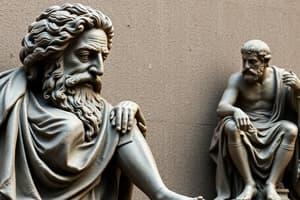Podcast
Questions and Answers
What is the term for the slow and regular change in the direction of Earth's axis?
What is the term for the slow and regular change in the direction of Earth's axis?
- Precession (correct)
- Rotation
- Revolution
- Nutational motion
Which model did Claudius Ptolemy famously represent in his work the Almagest?
Which model did Claudius Ptolemy famously represent in his work the Almagest?
- Elliptical model
- Heliocentric model
- Stellar model
- Geocentric model (correct)
What was the reason Ptolemy introduced epicycles in his cosmological model?
What was the reason Ptolemy introduced epicycles in his cosmological model?
- To simplify planetary orbits
- To accommodate retrograde motion (correct)
- To define the solar system's boundaries
- To explain the transits of planets
What astronomical phenomenon occurs due to Earth's position relative to a planet and the Sun?
What astronomical phenomenon occurs due to Earth's position relative to a planet and the Sun?
What did Ptolemy's model require regarding the placement of deferent circles?
What did Ptolemy's model require regarding the placement of deferent circles?
What method did Eratosthenes use to measure the Earth's circumference?
What method did Eratosthenes use to measure the Earth's circumference?
What did Eratosthenes conclude about the Earth's circumference based on his measurements?
What did Eratosthenes conclude about the Earth's circumference based on his measurements?
Which significant contribution is attributed to Hipparchus of Nicaea?
Which significant contribution is attributed to Hipparchus of Nicaea?
How did Hipparchus categorize stars in his catalog?
How did Hipparchus categorize stars in his catalog?
What phenomenon did Hipparchus discover about the north celestial pole?
What phenomenon did Hipparchus discover about the north celestial pole?
What did Eratosthenes observe on the summer solstice in Syene?
What did Eratosthenes observe on the summer solstice in Syene?
Which of the following best describes the system of apparent magnitude introduced by Hipparchus?
Which of the following best describes the system of apparent magnitude introduced by Hipparchus?
What was Eratosthenes' main motivation for measuring the Earth's circumference?
What was Eratosthenes' main motivation for measuring the Earth's circumference?
What did Aristotle propose regarding the shape of the Earth?
What did Aristotle propose regarding the shape of the Earth?
Which model did Aristarchus of Samos propose?
Which model did Aristarchus of Samos propose?
What reasoning did Aristarchus use to propose that the Sun is at the center of the universe?
What reasoning did Aristarchus use to propose that the Sun is at the center of the universe?
What phenomenon did Aristarchus use to support his model of the universe?
What phenomenon did Aristarchus use to support his model of the universe?
What was a primary reason other astronomers opposed Aristarchus’s heliocentric model?
What was a primary reason other astronomers opposed Aristarchus’s heliocentric model?
What did Aristotle believe about celestial bodies in relation to the Earth?
What did Aristotle believe about celestial bodies in relation to the Earth?
What did Aristarchus measure to support his claims?
What did Aristarchus measure to support his claims?
What was the conclusion of Aristarchus's observations regarding stellar parallax?
What was the conclusion of Aristarchus's observations regarding stellar parallax?
Flashcards are hidden until you start studying
Study Notes
Aristotle (384 – 322 BCE)
- Greek philosopher and scientist.
- Advocated for a geocentric model, placing Earth at the universe's center.
- Proposed Earth as a spherical body, supported by lunar eclipse observations.
- Believed in four classical elements: earth, water, air, fire, with Earth as the heaviest element central to the universe.
Aristarchus of Samos (310 – 230 BCE)
- Greek mathematician and astronomer who introduced the heliocentric model.
- Measured sizes and distances of the Earth, Sun, and Moon.
- Claimed stars are distant suns and highlighted the Sun's larger size as justification for its central position in the universe.
- Used geometric calculations and lunar phases to support his theories.
- Encountered opposition due to existing cultural beliefs and lack of observable stellar movement.
Eratosthenes of Cyrene (276 – 194 BCE)
- Greek astronomer, mathematician, geographer, and poet.
- First to measure Earth's circumference.
- Observed that sunlight was directly overhead in Syene during the summer solstice.
- Calculated Earth's circumference using angles: measured 7° in Alexandria, equating to 1/50 of Earth's circumference, resulting in an estimate of 250,000 stadia.
Hipparchus of Nicaea (190 – 125 BCE)
- Greek astronomer, geographer, and mathematician known for cataloging stars.
- Developed the apparent magnitude system, classifying stars based on brightness.
- Compiled a star catalog of about 850 entries with celestial coordinates.
- Discovered Earth's precession, observing changes in the position of the north celestial pole, indicating a continuous wobble of Earth’s axis.
Claudius Ptolemy (100 – 170 AD)
- Renowned Greek astronomer, geographer, and mathematician.
- Authored "Almagest," a comprehensive collection of astronomical knowledge.
- Promoted the geocentric model, explaining retrograde motion through the use of epicycles and deferents.
- Established the "equant point" to improve the representation of planetary motion, although actual planetary orbits are elliptical rather than circular.
Studying That Suits You
Use AI to generate personalized quizzes and flashcards to suit your learning preferences.




